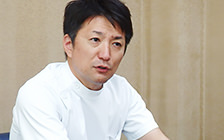
Anal fissure is basically caused by fecal abnormalities (too hard or too soft). The skin around the anus may be damaged by excessive washing or rubbing of the anus. Therefore, conservative therapy, such as improvement of stool consistency by diet and/or drug therapies, and instructions on proper defecation and proper anal irrigation, is the basic treatment of anal fissure. However, repeated recurrence of anal fissure for years may lead to narrowing of the anus (anal stenosis). Such a condition requires surgery. Surgery includes manual dilatation of the anus by inserting fingers into the anus to enlarge the narrowed anus or anal dilatation surgery performed for severe anal stenosis. Manual dilatation of the anus can be (easily) performed as outpatient surgery, but anal dilatation surgery requires hospitalization.

About 30% of patients with anal fissure underwent surgery at our hospital. OTC drugs may be effective against anal fissure with minor bleeding in its early stages, during which time anal fissure may repeatedly recur before complete wound healing, resulting in chronic anal fissure. In such a case, anal pain will persist for hours. In severe cases, pain persists for the rest of the day after defecation. Patients with such persistent pain must consult a physician. If patients with chronic anal fissure (even in the stage before that requiring radical surgery) visit a hospital earlier, such condition may be treated by outpatient surgery, such as anal sphincterotomy, in which the sphincter is incised to reduce the muscle tone by 20% to 30% and to allow patients to pass stools smoothly, or manual dilatation of the anus. However, such procedures are highly specialized, so patients must consult a proctologist.

Anal fissure is a tear in the lining about 1 cm from the anus. In cases of painful defecation or acute anal fissure that hurts when hard stools are passed, a hemorrhoidal ointment or stool softener is prescribed.
Chronic anal fissure may cause inflammation of the muscle, leading to anal stenosis (narrowing of the anus). For patients with such condition, surgery is performed. Anal fissure pain is not a pain when a tear occurs. Anal fissure pain is a dull pain when very hard stools are passed through the anus. Surgery is often performed on patients who are experiencing persistent dull pain for hours after defecation. Other than the above, there is another type of anal disorder, "associated anal fissure," which is a condition in which anal fissure is caused by hemorrhoids (piles) repeatedly passing through the anus, protruding and retracting. In such a case, hemorrhoidectomy must be performed because anal fissure cannot be cured unless hemorrhoids (piles) are excised.

Anal fissure may repeatedly recur alternating tearing and healing, during which time narrowing of the anal canal or swelling around the anal fissure may occur. "Anal fissure," "external skin tag," and "internal polyp" are 3 major conditions that may coexist, and these further aggravate symptoms. The initial treatment of anal fissure is the same as that of hemorrhoids (piles) except that for anal fissure an ointment is applied to relax the anal sphincter. If there is no alleviation of symptoms, surgery is required. Surgery is not to cure the anal fissure itself, but to alleviate the anal fissure by widening the anal canal to return it to the former state. A surgical procedure termed "anoplasty" is performed; however, if the anal canal is excessively widened, fecal incontinence may occur. Therefore, it is performed with the greatest care. The causes of anal stenosis vary, such as narrowing of the passage for stools due to rigid muscles and tightening and narrowing of the anal canal due to hardening of the perianal skin. It is important for physicians to identify the cause of anal fissure and to determine treatment suitable for the patient.
